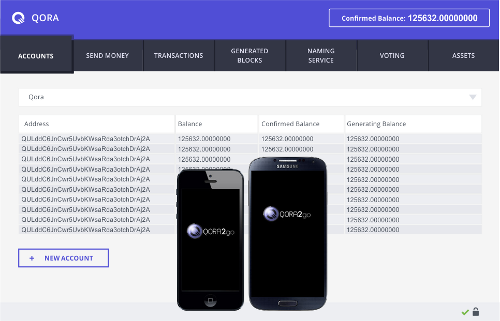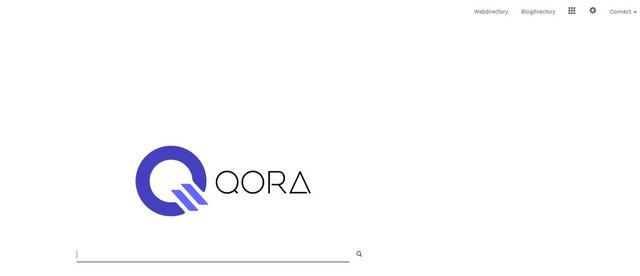Qora and its Automated Features Could Change The Crypto Landscape
Consider this my attempt to keep Qora alive. As of today it appears that the entire Dev team has abandoned one of the more innovative coins on the market today, apparently because the whales would not help support the coin.
This is not the first time it has happened with Qora and it rebounded quite nicely when a new Dev team showed up in 2015 (vbcs and Vrontis). Ian Knowles from CIYAM is quite active in the Qora thread on BitcoinTalk, but is not actively coding Qora. I'm sure at least one good Developer will show up to restore this coin to it's proper place in the ecosystem, but at this time, it's looking for one. So if you're a coin Dev looking for a solid project to continue, Qora is one of the best! Now on to the write up to explain what Qora is and what it can do.
Several upstart cryptocurrencies have experienced a period of substantial growth given the inherent volatility of the crypto-market. One such coin is Qora.
Qora is an Open-source proof-of-stake coin with all of its shares beginning in play. Rather than being 'mined' periodically, a process which draws heavily on the computing power of the miner, Qora coins are generated through a process referred to as “forging” by randomly selecting a participating Qora account to confirm that the next block of transactions are correct. The selected account is then rewarded with all transaction fees from the solved block. As time passes, those who hold Qora will see it continue to grow as they continue to forge; that is, their wallets continue to process transactions and earn fees.
Forging
Forging's primary purpose is to protect the network and ensure that transactions are verified, thus fraud is virtually non-existent. Those who help to protect and run the network are rewarded through transaction fees earned whenever a wallet forges a block. To further ensure the safety of the network and it's users, Qora boast deterministic and password protected wallets that can be recovered / generated from seeds.
Its creator hails it as a “second-generation cryptocurrency” designed from scratch. While a vast number of other cryptos have built upon, borrowed, or copied from the original algorithms featured in bitcoin, Qora's founder deviated from this industry practice in an attempt to bring flexibility and ease-of-use to its users. With a lower barrier-to-entry than its alternatives, Qora is thus an attractive option for long-term investors who have been itching to enter the cryptomarket.
Despite its volatility, the burgeoning cryptomarket presents ample opportunity for Qora and its stakeholders to continue growing. Stakeholders may have the chance to see the value of their investment increase tenfold. Qora's addition of new developers to its team has rallied its market share in recent months with the promise of new and updated features.
Name Payments
One feature found in few cryptocurrencies today is Name Payments, which allows Qora holders to send payments to a name registered on the blockchain. These names can be bought and sold within the client on the Naming Services internal exchange. As an added security feature, payments sent to names that are for sale on the internal exchange will be forbidden as long as they are for sale. Names with a leading or trailing space-character will be permanently forbidden for name payments. The Name Payments feature is scheduled to be included in the next release (v19) along with a MapDB update and some minor fixes. Windows, MAC and Linux versions will all be updated. We have no firm release date on the new wallet design or the mobile wallet but they do not appear to be far from completion.
Voting
Qora also experiments by taking its role as a medium of exchange even further through its implementation of voting protocols. It is a veritable bitcoin 2.0, bringing features into the cryptomarket bitcoin's creator chose not to implement. Because the coin is relatively unknown, this feature has seen use only as it pertains to the adoption of new features for the coin itself. But despite its limited scope, stakeholders can have a direct impact on Qora's future features as well as its market direction. Polls can be created directly by any user and can be voted on by any stakeholder. Votes are weighted depending upon how much Qora a user holds. A petition to 'hire additional developers' may be seen and voted on by all Qora users within the client.
Unlike a real-world election, there is no polling place nor is there a concern for voter fraud thanks to the blockchain, an algorithm which verifies the authenticity of each transaction on the network. Qora's immense flexibility lends itself to unpredictable future opportunities. Its voting feature may be relegated to the adoption of new coin features for now, but through this process Qora could be adapted even for legitimate political elections. While it wouldn't be alone in its attempts to decentralize and crypto-fy democracy, its easy-to-use REST API gives it a distinct advantage over other cryptocurrencies and webprojects like BitCongress.
However, in spite of its array of features, an investment solely in Qora would be about as wise as putting all of your eggs in one basket. Many of us hold our money in fiat, various cryptocurrencies, precious metals or stock investments. Diversifying one's assets provides enormous benefit and security to those investments; but Qora boasts the ability to do something few cryptos can -- asset creation. By providing its initial stake, you can create an exchangeable asset and divest it as you see fit. It facilitates the creation of contracts and other inter-user business arrangements.
Turing Complete Smart Contracts
Qora's adaptability enables it to bring a variety of other features to the mix. As mentioned before, any stakeholder can propose a vote and often these votes are for new features, like automated transactions (scheduled for v20). Qora is on track to be one of the first coins to boast this feature. According to its developers at CIYAM.org:
In brief an Automated Transaction (AT) is a "Turing complete" set of byte code instructions which will be executed by a byte code interpreter built into its host. An AT supporting host platform automatically supports various applications ranging from games of chance to automated crowdfunding and ensuring that "long term savings" are not lost forever.
This means that Qora becomes open to infinite possibilities. Automated Transactions provide Turing Complete smart contracts hosted on the blockchain, thus anyone will be able to create his own program, script, or smart contract. For example, stakeholders may propose to create a lottery. Its payout would be automated, so no third-party would be responsible for managing the game or its balance. The AT feature is not limited to gambling. Automated transactions also enable 'smart contracts' which are financial arrangements that self-execute when certain conditions are met. Crowdfunding can be done by enabling ATs to refund donors if a target amount has not been reached.
ATs also enabled crypto-auctions to become a reality. In the past, users couldn't bid on an item unless they trusted the user to return their amount in the event someone outbid them. Not only was this dubious, but it was inefficient because each transaction exacts a small fee. Automated transactions allow users to send funds which can be automatically refunded if they are outbid. Online commerce got its start in e-auction houses like eBay. Auction houses facilitate commerce by providing an efficient and reliable forum for users to exchange goods and services more directly.
Automated transactions also enable users to create conditions under which funds can be automatically transferred in the event an account goes dormant. Much like the divestment of assets through a last will and testament, a dormant funds transfer can occur to mark the end or beginning of a cycle. The possibilities for managing one’s funds are limitless. A cryptocurrency with this capacity makes for a sound future investment.
Dormant accounts enable Qora to also provide ‘proof-of-burn’. As with Counterparty, the proof-of-burn process would permit stakeholders to permanently ‘burn’ a varying portion of their Qora. The concept of permitting users to destroy their perfectly good value may strike some users as odd, perhaps backwards. But the process of ‘burning’ the cryptocurrency doesn’t see the value of the coin drop. On the contrary: this deflationary procedure in effect makes each remaining Qora coin more valuable. For example, a developer or service provider may use Qora to create a profitable distributed autonomous organization, requesting investors to send their initial stake to a ‘burn’ account. These coins would remain untouchable, but those who burned would receive the product or services requested. Each time the service provider receives payment, he may burn some small amount of Qora, in essence paying a dividend to all holders. Smaller coins, like Ripple, feature this ‘proof-of-burn’ process but Ripple, unlike Qora, is a fully centralized crytpocurrency which severely limits its functionality.
Not only could these processes help to maintain the stability of a coin’s price on the market, they also afford an opportunity to pay interest through the use of an automated transaction. Through the creation of these dormant accounts, one could create an account in escrow or an account with limited transferability. The latter might be established as a banking service, allowing users to deposit their Qora while limiting withdrawals. Automated interest payments, facilitated through AT scripts, offer an incentive for stakeholders to deposit their Qora in the first place.
Atomic Cross-Chain Transactions
Perhaps its most flexible feature of all, Qora holders will soon be able to conduct transactions directly with separate cryptocurrencies. Qora will use an automated transaction to enable an “atomic cross-chain transfer” to be executed, allowing users to circumvent the need for any centralized third-party exchange. This prevents the problem of what to do when A trades with B via a third-party only to realize B backed out after collecting A's transaction.
Decentralized Web Server & Social Media
In 2015 Qora added a decentralized web server built into the client that allows users to create blogs that can be viewed through a local browser. You can view the centralized version, which is much like Steemit, here at the blockexplorer site run by agran. Or if you would like to view the decentralized version, download the wallet linked below and start browsing via the decentralized web server and start your own decentralized blog!
For all its immense capabilities, Qora remains one of the cheapest coins on the crypto-market. Still with its community organized, and when new developers join its team, Qora can continue to deliver on its mission, empowering its stakeholders with new tools for encrypted commerce and exchange.
Qora Resources




I think the last Qora block found on the qora.co.in site, was on July 5th, but now the qora.co.in site isn't loading - any clue what is up with Qora?
Qora wallet @ polo' is Temporarily Disabled. I think something similar happened a couple weeks ago on Qora blockchain, as my client mined a few blocks, but I believe it was on a forked chain, and the main chain finally came back after about 4 days on the http://qora.co.in site (and my mined blocks were no more).
No clue man sorry. I've been 100% dedicated to Steem for the past few months.
And Thank you for that! Steem seems like it can be a really powerful tool - thanks to those who are brining forth this awesome platform, your time seems to have been well-spent.
Also, it now looks like the main qora.co.in and block explorer are back to working, fwiw.